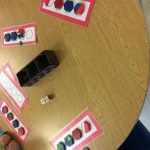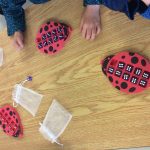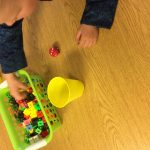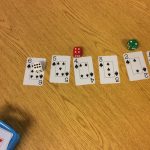Through participation in other inquiries, we had been introduced to resources that created amazing contexts for doing real-life math in the kindergarten room. However, our school did not own these resources and we did not have sufficient time to make permanent changes to our teaching. Starting from student needs, we decided to target number sense and patterning. Based on a review of resources, we purchased a number of rich books that we hoped would increase engagement and help to build fluency with these math concepts. We worked collaboratively as a team to create lessons and tasks using these resources, reviewed student work, and planned our next steps.
Team Members
Christine Leimgardt
Bluewater District School Board
Roxanne Young
Bluewater District School Board
Julie Madill
Kathy Campbell
Professional Learning Goals
- Gained a deeper conceptual understanding of number sense and patterning
- Connected literacy and math in our planning and teaching (using real and relevant contexts)
- Changed our teaching practice from math in isolation to math within a larger context for students
- Increased the frequency of our use of rich, parallel and open math problems
Activities and Resources
During our first release time, we assessed our current math resources and compiled a list of appropriate literature to reinforce math concepts to be taught. Next, we reviewed the books we ordered and planned how we would use them in our patterning unit. We tried the activities in our classroom, debriefed and modified our plans.
As a team, we attended the “Passionately Curious Educators: Play-Based Mathematics” workshop in Kitchener where we learned a variety of math activities and games that we could take back and use in our classroom. We also learned a variety of ways to integrate math throughout our day. We created and implemented multiple number sense math games. We have attached pictures of our students participating in the games we created.
Unexpected Challenges
Our school is very unique in that it has an ELL population of more than 40 per cent predominantly David Martin Mennonite. When the students arrive in kindergarten, many of them do not speak English and, due to the self-contained nature of their community, they are introduced to a new culture for the first time. One of our main challenges was finding resources that met their cultural needs and increased their engagement in discussions.
Enhancing Student Learning and Development
After using books to introduce math concepts, we noticed an increase in the level of discussions and the students were able to talk about examples from the books. The children were able to see how math occurs every day and all around us. We also feel they were a visual tool for our ESL students to bring meaning to abstract concepts through the use of pictures. We observed more math discussion during structured and unstructured activity time.
Our students are very engaged in the games we made and we have seen an improvement in their number sense understanding.
Sharing
Throughout the year we shared our resources and activities we created during our school staff meetings. We have made the books and games available to other staff members to use in their classrooms.
We also shared pictures of the games we created on our school board Early Learning site, as well as the Kindergarten Facebook group page.
Project Evaluation
We feel our project was successful because our goals were met and we observed an increase in students’ interest which directly reflected their comprehension and real-life connections.
Our project was very practical and we were able to participate in a variety of activities such as team planning, attending workshops and purchasing resources for our classrooms.
Our project ran well because it allowed time for us to collaborate as a team and plan and implement activities we can use in our classroom throughout the day.
We have compiled a comprehensive package of math books that provide new examples and ways of explaining math concepts.
We feel the most rewarding part of our journey was attending the math workshop as a team. We came away with a number of ideas to include math throughout our day and were very eager to make and try out the math games presented to us.
Resources Created
These resources will open in your browser in a new tab, or be downloaded to your computer.





